This display marks the tercentenary of the birth of David Garrick (1717-79), celebrated actor, playwright and Drury Lane theatre manager. ‘Isn’t that next year?’ you ask. Well, yes, but we’re starting the celebrations early at the V&A! In fact, on one occasion, Garrick himself seems to have been uncertain of his age, reminding his brother Peter on 12 May [1752] that he had promised ‘to send My Age as it is written in ye Olde Bible, with ye Erasement & interlineation’.
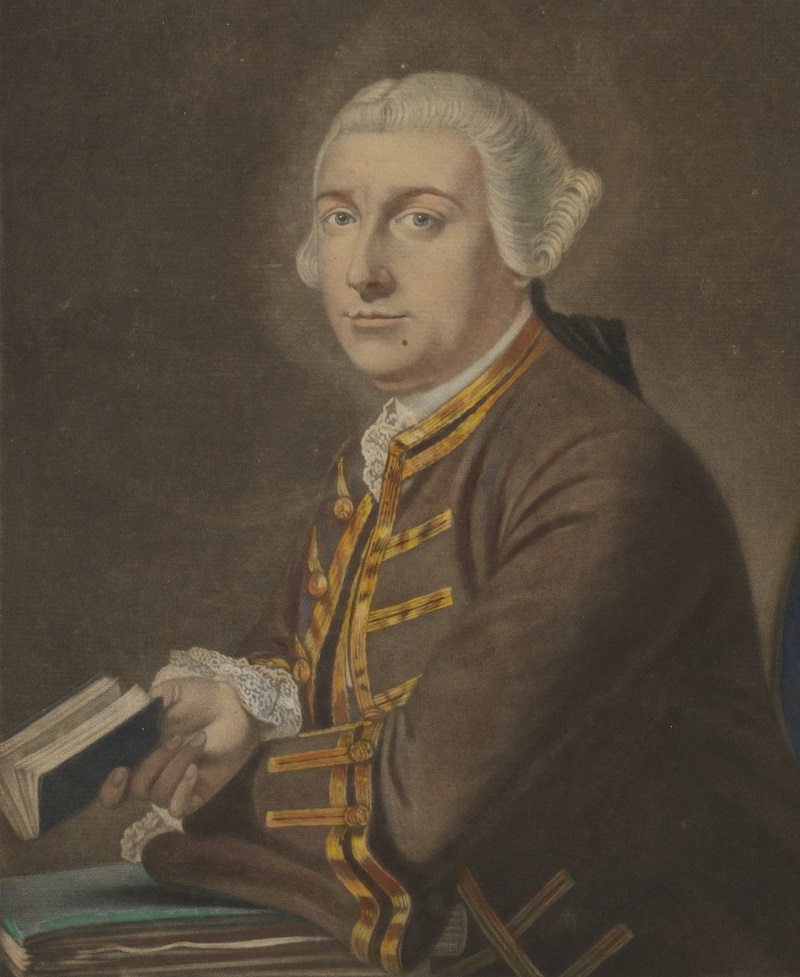
Garrick was a passionate collector of rare books who assembled a private library of considerable distinction. Rich in old English plays (which he bequeathed to the British Museum in 1779) and books on theatre history, it was (and continues to be) recognised as a vital scholarly resource by editors of Shakespeare and other English dramatists. But Garrick’s literary tastes were not confined to drama. One contemporary, Percival Stockdale, observed that his general library, which comprised over 3,000 volumes, ‘contained the best Roman authours; and the most eminent writers in modern literature’.
The sale catalogue of Garrick’s library reveals the remarkable breadth of his intellectual and literary interests (he advised an aspiring actor, John Henderson, to read ‘other books besides those of the Theatre’), his patronage of contemporary writing and his engagement with the rare book trade. Garrick’s wife, Eva Maria Veigel (1724-1822), survived him by forty-three years so it was not until April 1823 that the general library came under the auctioneer’s hammer, an event that aroused considerable anticipation and rivalry among book collectors: one journalist predicted that it would ‘prove a bonne bouche for the Bibliomanes or Bibliomaniacs’.
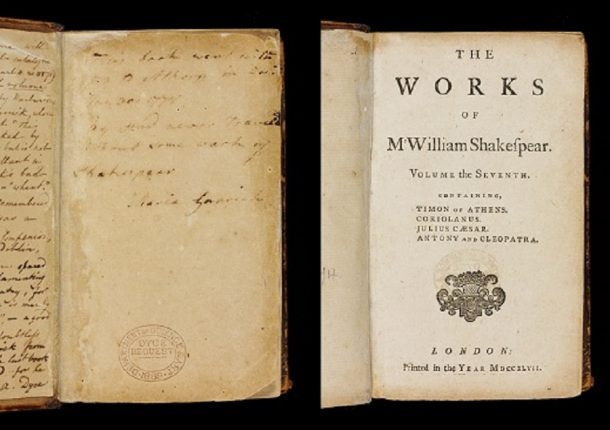
Such was Garrick’s enduring celebrity among the performing arts fraternity that his books and manuscripts came to be coveted as precious relics. Sir Laurence Olivier owned Garrick’s copy of Alexandre Savérien’s Histoire des Philosophes Modernes (Paris, 1761-64), now at the Folger Shakespeare Library, although he would perhaps have preferred a more explicitly dramatic title to emphasise their shared theatrical lineage. Bram Stoker, author of Dracula and manager of Henry Irving’s Lyceum Theatre (Stoker described Irving as ‘the Garrick of his age’), assembled an important collection of autograph letters and manuscripts. Harry Houdini, the famous escapologist and illusionist, counted Garrick’s manuscript diary of his journey to Paris (1751), now at the Harry Ransom Center, The University of Texas at Austin, among his bibliographical treasures.
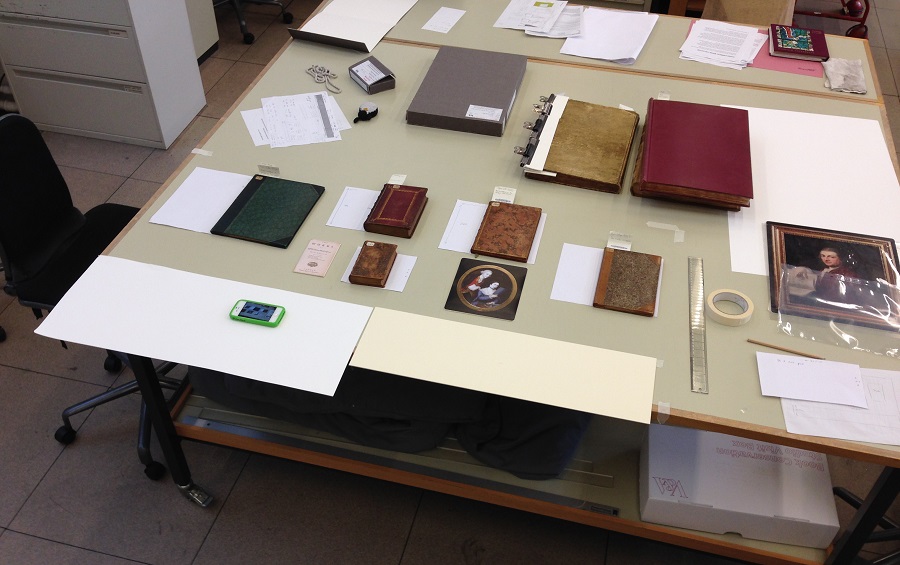
A number of Garrick’s booked ended up in the ownership of Alexander Dyce, the 19th-century Shakespeare editor, who bequeathed his library to the V&A in 1869. This display showcases a selection of these alongside manuscript and graphic materials to illuminate Garrick’s complementary roles of performer and book collector.
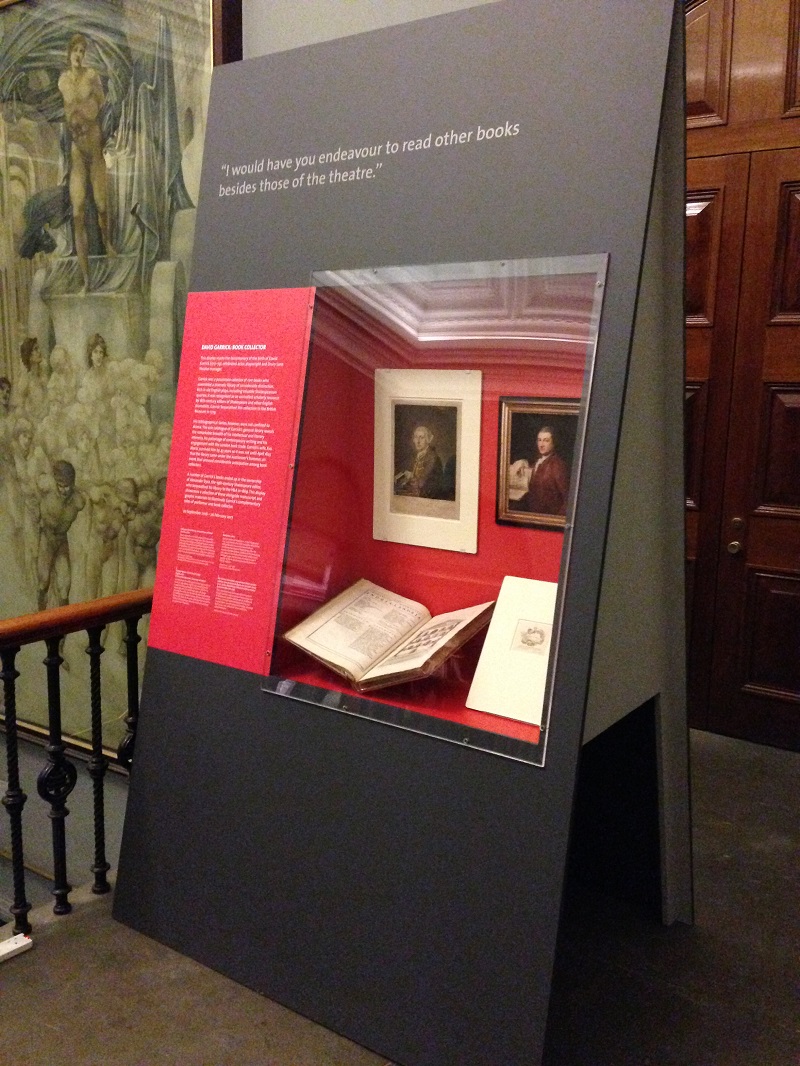
Not everyone was convinced by Garrick’s offstage role of book collector. Dr Johnson, the famous lexicographer, dismissed his knowledge of books with one of his trademark put-downs: ‘Lookee, David, you do understand plays, but you know nothing about books’. This display proposes that Garrick knew rather more about books than Johnson was prepared to credit him and that for this actor, book collecting could be both a serious and a sociable pursuit.
Related blog: Calling all book detectives: Garrick’s Plato
Room 85 (Library Landing), 20 September 2016 – 1 May 2017
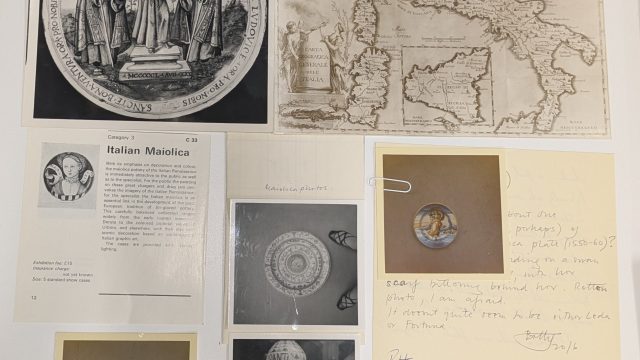


Att. Mr Nicholas Smith. Re the books of David Garrick.
I have Garrick`s copy of Rowley`s “Poems” 1778, formerly in the library of Cecil Harmsworth. It has the Garrick b/plate and a note by h/worth loosely inserted.Happy to provide further info . I have a substantial library relating to Johnson,Boswell & their Circle some of which is on display at Johnson`s House in London at present. Please respond.
Mr. Smith, for your research and interest (perhaps) I have a single volume that contains three items bound together: the play Eurydice by Mallet , the play Periander by Tracy and a sermon by Bowman given at Wakefield. The volume seems to have been bound about 1731. Inside the front cover is a penciled signature of “A. Evans 1740” and above that the script initials “DG.” Another pencil inscription on the facing page says simply “David Garrick,” with an arrow pointing toward the DG. I know it’s not likely that the DG was written by Garrick, and the pencil note on the facing page is simply a clever joke, but, just in case, do you know whether Garrick wrote his initials in books that he read or that passed through his hands? Regards, Tom
Thank you for your message. My apologies for the slow reply but I left the V&A a few years ago. I can find no explicit reference to this volume in the 1823 sale catalogue of Garrick’s library, although several lots comprised bundles of unidentified plays, and there had been various depredations prior to the auction. Garrick played Periander in the 1759 revival of Mallet’s Eurydice at Drury Lane (Tracy’s play premiered a few weeks before Mallet’s in 1731 obliging Mallet to change the title from Periander to Eurydice), so one can see how such a compilation might appeal to Garrick; the presence of a sermon by Bowman in the volume seems incongruous, although evidently bound in by an earlier owner. I can recall seeing only volume bearing Garrick’s initials, which followed a note in his autograph – you can see an image here (click on the middle thumbnail): https://www.oakknoll.com/pages/books/128979/nicholas-d-smith/actors-library-david-garrick-book-collecting-and-literary-friendships-an); it is more usual to find his bookplate on the front pastedown, inserted either by Garrick himself or at the time of the book auction. Consequently, I think you are right to be wary, but the volume may repay further investigation. Thank you for bringing it to my attention.